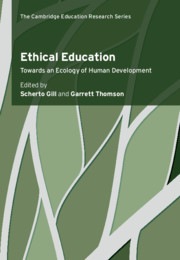Book contents
- Ethical Education
- Ethical Education
- Copyright page
- Contents
- Contributors
- General Introduction
- Part I Theoretical Perspectives on Ethical Education
- Part II Pedagogical Approaches to Ethical Education
- Introduction to Part II
- 4 Changing Cultures
- 5 Ethical, Existential and Spiritual Re-Orientation
- 6 Confirming Moral Agency
- Conclusion to Part II
- Part III Ethical Education in Practices
- Notes
- Bibliography
- Index
Introduction to Part II
from Part II - Pedagogical Approaches to Ethical Education
Published online by Cambridge University Press: 30 June 2020
- Ethical Education
- Ethical Education
- Copyright page
- Contents
- Contributors
- General Introduction
- Part I Theoretical Perspectives on Ethical Education
- Part II Pedagogical Approaches to Ethical Education
- Introduction to Part II
- 4 Changing Cultures
- 5 Ethical, Existential and Spiritual Re-Orientation
- 6 Confirming Moral Agency
- Conclusion to Part II
- Part III Ethical Education in Practices
- Notes
- Bibliography
- Index
Summary
One shouldn’t be surprised that the ethical approach advocated in this work has distinctive pedagogical implications. As we saw in the previous part of the book, defining ethics in terms of the qualities of relationships transforms one’s vision of ethical education. At its heart, such education is no longer a lesson or an acquisition, nor a means to something else. The chapters in this part articulate what pedagogy should look like from within a relational vision. They suggest that the core of ethical education is consisted of everyone’s relationships to each other within a school community. Pedagogy is constituted by relationships.
- Type
- Chapter
- Information
- Ethical EducationTowards an Ecology of Human Development, pp. 63 - 66Publisher: Cambridge University PressPrint publication year: 2020

